International Business & Culture Experience Project Report - INB 4500
VerifiedAdded on 2020/10/22
|54
|15552
|38
Report
AI Summary
This report, prepared for INB 4500, provides a comprehensive analysis of international business and cultural influences, focusing on the distinct business environments of India and the United Kingdom. The report begins with an introduction to culture, defining its characteristics and impact on global business strategies. It explores the cultural dimensions, including collectivism, individualism, and communication styles, and their effects on business operations. The main body delves into the economic backgrounds of India and the UK, highlighting the key differences in their business cultures, etiquette, and practices. The report also provides strategic recommendations for effective cross-cultural communication. Furthermore, it discusses the importance of corporate social responsibility in the UK context. The report concludes with a summary of key findings and recommendations for businesses operating in these diverse cultural landscapes.

INB 4500 INTERNATIONAL BUSINESS
& CULTURE EXPERINCE PROJECT
& CULTURE EXPERINCE PROJECT
Paraphrase This Document
Need a fresh take? Get an instant paraphrase of this document with our AI Paraphraser
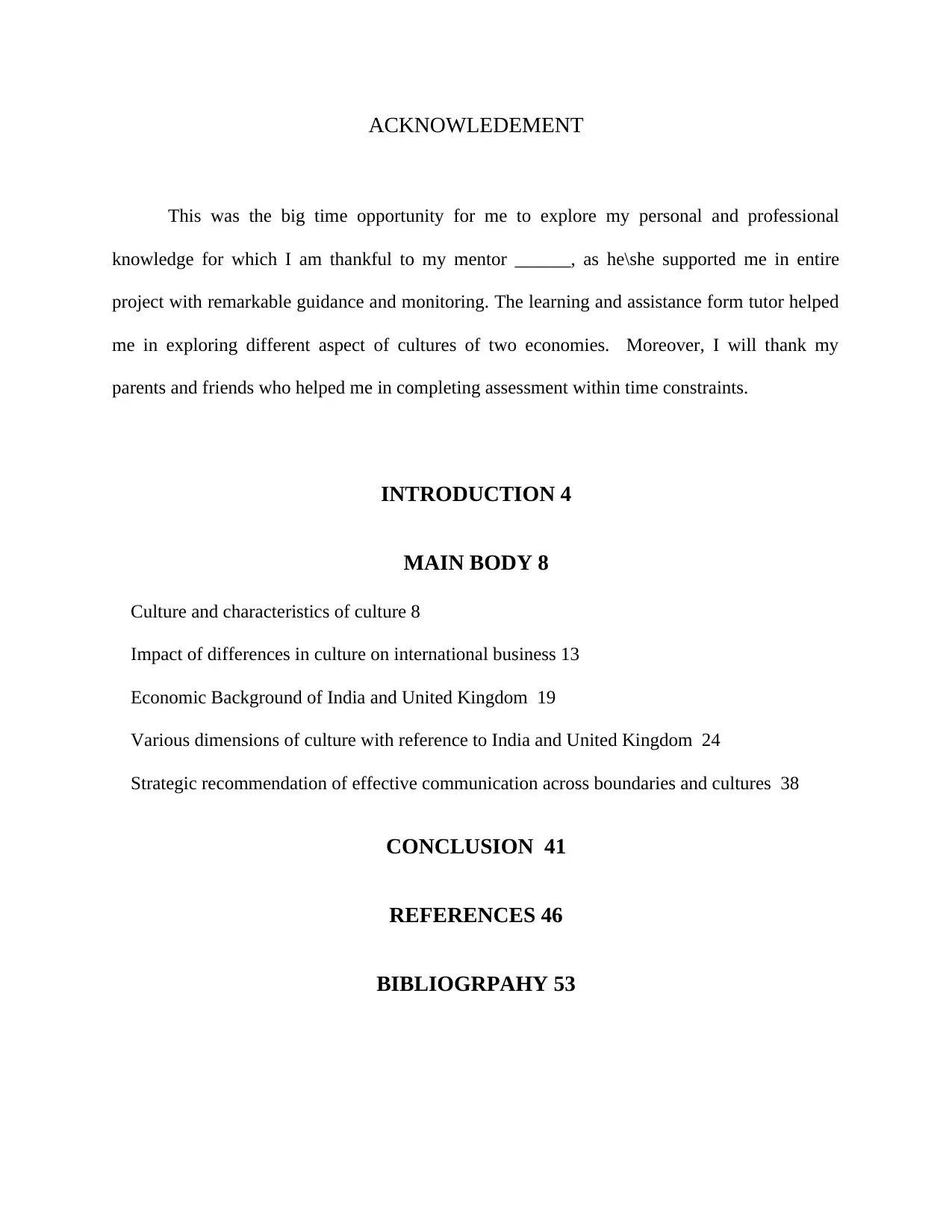
ACKNOWLEDEMENT
This was the big time opportunity for me to explore my personal and professional
knowledge for which I am thankful to my mentor ______, as he\she supported me in entire
project with remarkable guidance and monitoring. The learning and assistance form tutor helped
me in exploring different aspect of cultures of two economies. Moreover, I will thank my
parents and friends who helped me in completing assessment within time constraints.
INTRODUCTION 4
MAIN BODY 8
Culture and characteristics of culture 8
Impact of differences in culture on international business 13
Economic Background of India and United Kingdom 19
Various dimensions of culture with reference to India and United Kingdom 24
Strategic recommendation of effective communication across boundaries and cultures 38
CONCLUSION 41
REFERENCES 46
BIBLIOGRPAHY 53
This was the big time opportunity for me to explore my personal and professional
knowledge for which I am thankful to my mentor ______, as he\she supported me in entire
project with remarkable guidance and monitoring. The learning and assistance form tutor helped
me in exploring different aspect of cultures of two economies. Moreover, I will thank my
parents and friends who helped me in completing assessment within time constraints.
INTRODUCTION 4
MAIN BODY 8
Culture and characteristics of culture 8
Impact of differences in culture on international business 13
Economic Background of India and United Kingdom 19
Various dimensions of culture with reference to India and United Kingdom 24
Strategic recommendation of effective communication across boundaries and cultures 38
CONCLUSION 41
REFERENCES 46
BIBLIOGRPAHY 53

⊘ This is a preview!⊘
Do you want full access?
Subscribe today to unlock all pages.

Trusted by 1+ million students worldwide
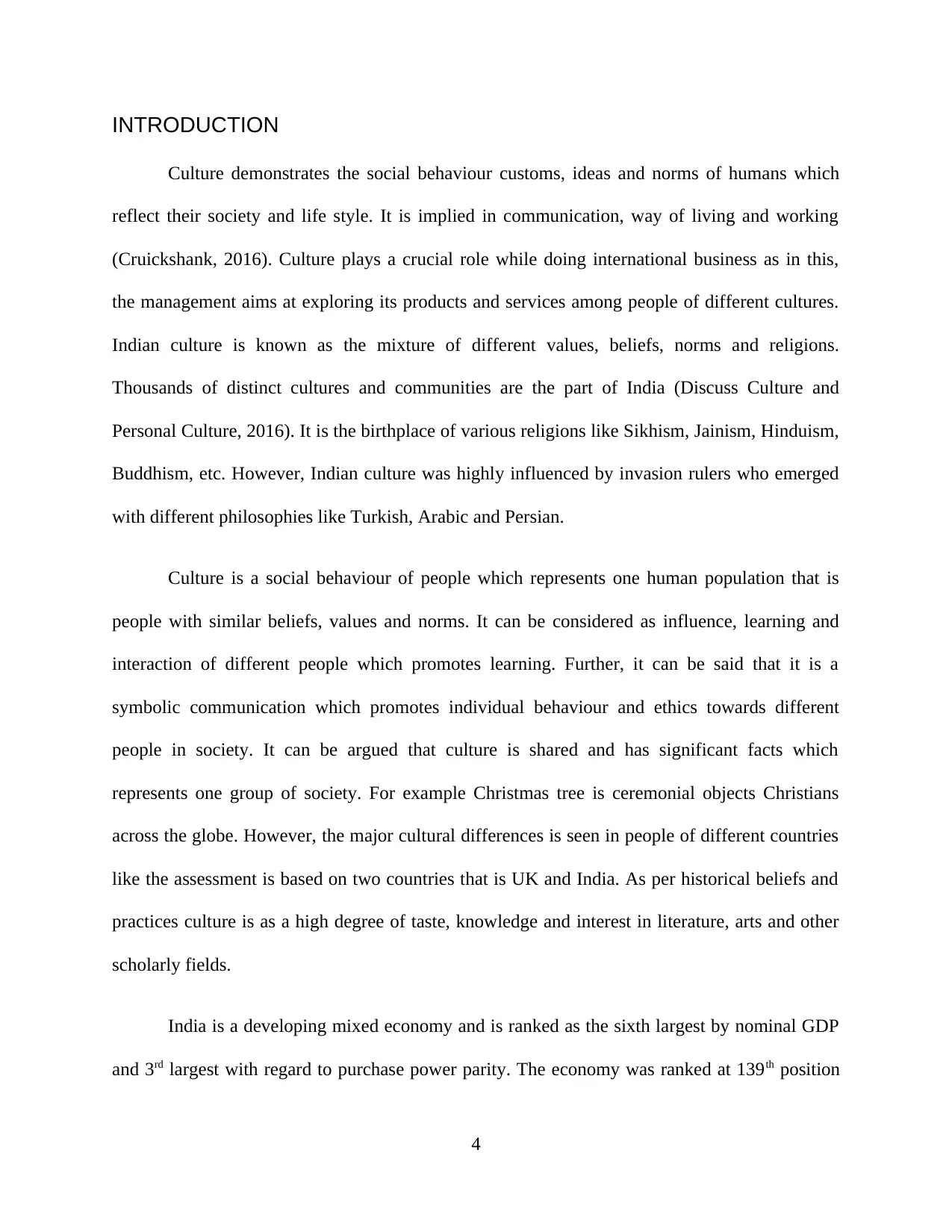
INTRODUCTION
Culture demonstrates the social behaviour customs, ideas and norms of humans which
reflect their society and life style. It is implied in communication, way of living and working
(Cruickshank, 2016). Culture plays a crucial role while doing international business as in this,
the management aims at exploring its products and services among people of different cultures.
Indian culture is known as the mixture of different values, beliefs, norms and religions.
Thousands of distinct cultures and communities are the part of India (Discuss Culture and
Personal Culture, 2016). It is the birthplace of various religions like Sikhism, Jainism, Hinduism,
Buddhism, etc. However, Indian culture was highly influenced by invasion rulers who emerged
with different philosophies like Turkish, Arabic and Persian.
Culture is a social behaviour of people which represents one human population that is
people with similar beliefs, values and norms. It can be considered as influence, learning and
interaction of different people which promotes learning. Further, it can be said that it is a
symbolic communication which promotes individual behaviour and ethics towards different
people in society. It can be argued that culture is shared and has significant facts which
represents one group of society. For example Christmas tree is ceremonial objects Christians
across the globe. However, the major cultural differences is seen in people of different countries
like the assessment is based on two countries that is UK and India. As per historical beliefs and
practices culture is as a high degree of taste, knowledge and interest in literature, arts and other
scholarly fields.
India is a developing mixed economy and is ranked as the sixth largest by nominal GDP
and 3rd largest with regard to purchase power parity. The economy was ranked at 139th position
4
Culture demonstrates the social behaviour customs, ideas and norms of humans which
reflect their society and life style. It is implied in communication, way of living and working
(Cruickshank, 2016). Culture plays a crucial role while doing international business as in this,
the management aims at exploring its products and services among people of different cultures.
Indian culture is known as the mixture of different values, beliefs, norms and religions.
Thousands of distinct cultures and communities are the part of India (Discuss Culture and
Personal Culture, 2016). It is the birthplace of various religions like Sikhism, Jainism, Hinduism,
Buddhism, etc. However, Indian culture was highly influenced by invasion rulers who emerged
with different philosophies like Turkish, Arabic and Persian.
Culture is a social behaviour of people which represents one human population that is
people with similar beliefs, values and norms. It can be considered as influence, learning and
interaction of different people which promotes learning. Further, it can be said that it is a
symbolic communication which promotes individual behaviour and ethics towards different
people in society. It can be argued that culture is shared and has significant facts which
represents one group of society. For example Christmas tree is ceremonial objects Christians
across the globe. However, the major cultural differences is seen in people of different countries
like the assessment is based on two countries that is UK and India. As per historical beliefs and
practices culture is as a high degree of taste, knowledge and interest in literature, arts and other
scholarly fields.
India is a developing mixed economy and is ranked as the sixth largest by nominal GDP
and 3rd largest with regard to purchase power parity. The economy was ranked at 139th position
4
Paraphrase This Document
Need a fresh take? Get an instant paraphrase of this document with our AI Paraphraser
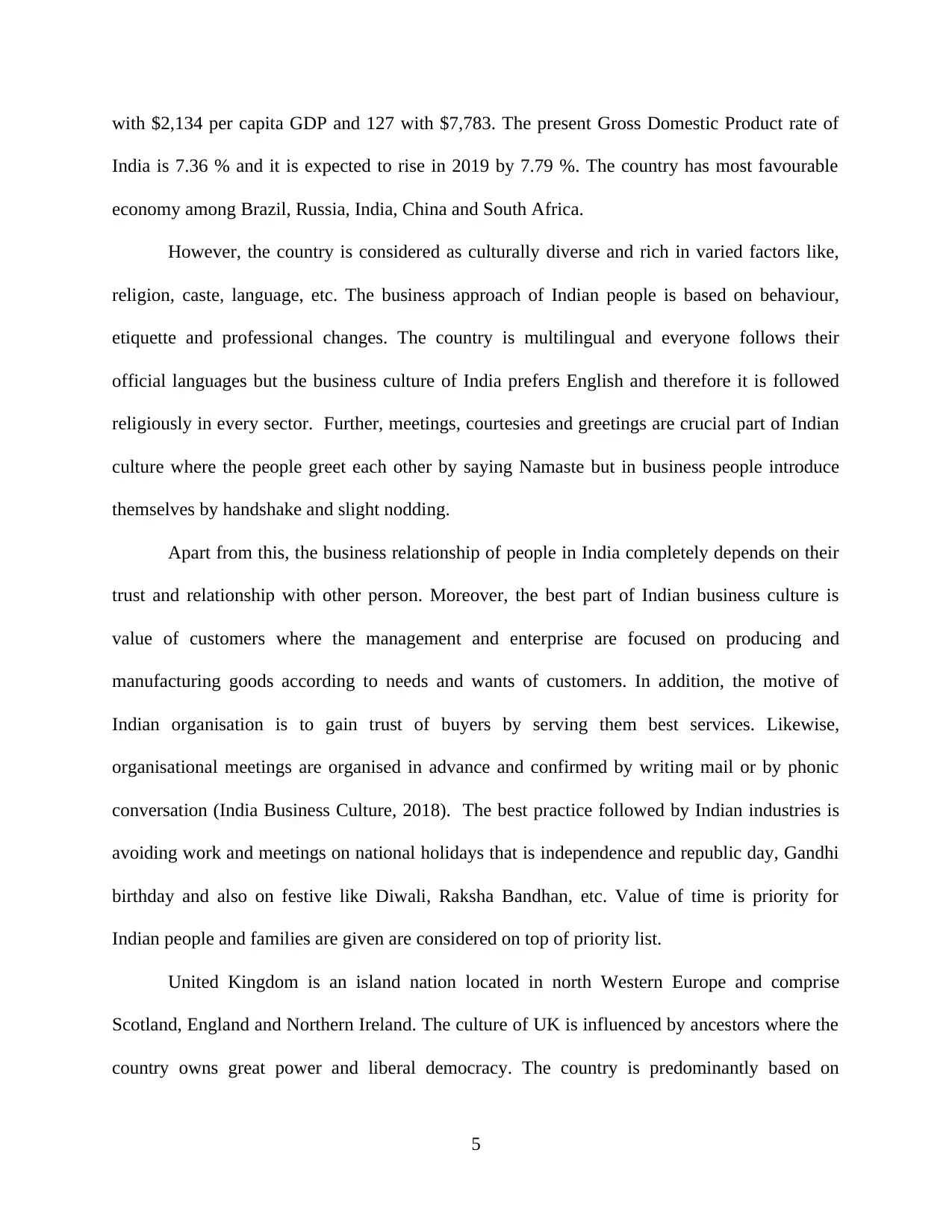
with $2,134 per capita GDP and 127 with $7,783. The present Gross Domestic Product rate of
India is 7.36 % and it is expected to rise in 2019 by 7.79 %. The country has most favourable
economy among Brazil, Russia, India, China and South Africa.
However, the country is considered as culturally diverse and rich in varied factors like,
religion, caste, language, etc. The business approach of Indian people is based on behaviour,
etiquette and professional changes. The country is multilingual and everyone follows their
official languages but the business culture of India prefers English and therefore it is followed
religiously in every sector. Further, meetings, courtesies and greetings are crucial part of Indian
culture where the people greet each other by saying Namaste but in business people introduce
themselves by handshake and slight nodding.
Apart from this, the business relationship of people in India completely depends on their
trust and relationship with other person. Moreover, the best part of Indian business culture is
value of customers where the management and enterprise are focused on producing and
manufacturing goods according to needs and wants of customers. In addition, the motive of
Indian organisation is to gain trust of buyers by serving them best services. Likewise,
organisational meetings are organised in advance and confirmed by writing mail or by phonic
conversation (India Business Culture, 2018). The best practice followed by Indian industries is
avoiding work and meetings on national holidays that is independence and republic day, Gandhi
birthday and also on festive like Diwali, Raksha Bandhan, etc. Value of time is priority for
Indian people and families are given are considered on top of priority list.
United Kingdom is an island nation located in north Western Europe and comprise
Scotland, England and Northern Ireland. The culture of UK is influenced by ancestors where the
country owns great power and liberal democracy. The country is predominantly based on
5
India is 7.36 % and it is expected to rise in 2019 by 7.79 %. The country has most favourable
economy among Brazil, Russia, India, China and South Africa.
However, the country is considered as culturally diverse and rich in varied factors like,
religion, caste, language, etc. The business approach of Indian people is based on behaviour,
etiquette and professional changes. The country is multilingual and everyone follows their
official languages but the business culture of India prefers English and therefore it is followed
religiously in every sector. Further, meetings, courtesies and greetings are crucial part of Indian
culture where the people greet each other by saying Namaste but in business people introduce
themselves by handshake and slight nodding.
Apart from this, the business relationship of people in India completely depends on their
trust and relationship with other person. Moreover, the best part of Indian business culture is
value of customers where the management and enterprise are focused on producing and
manufacturing goods according to needs and wants of customers. In addition, the motive of
Indian organisation is to gain trust of buyers by serving them best services. Likewise,
organisational meetings are organised in advance and confirmed by writing mail or by phonic
conversation (India Business Culture, 2018). The best practice followed by Indian industries is
avoiding work and meetings on national holidays that is independence and republic day, Gandhi
birthday and also on festive like Diwali, Raksha Bandhan, etc. Value of time is priority for
Indian people and families are given are considered on top of priority list.
United Kingdom is an island nation located in north Western Europe and comprise
Scotland, England and Northern Ireland. The culture of UK is influenced by ancestors where the
country owns great power and liberal democracy. The country is predominantly based on
5
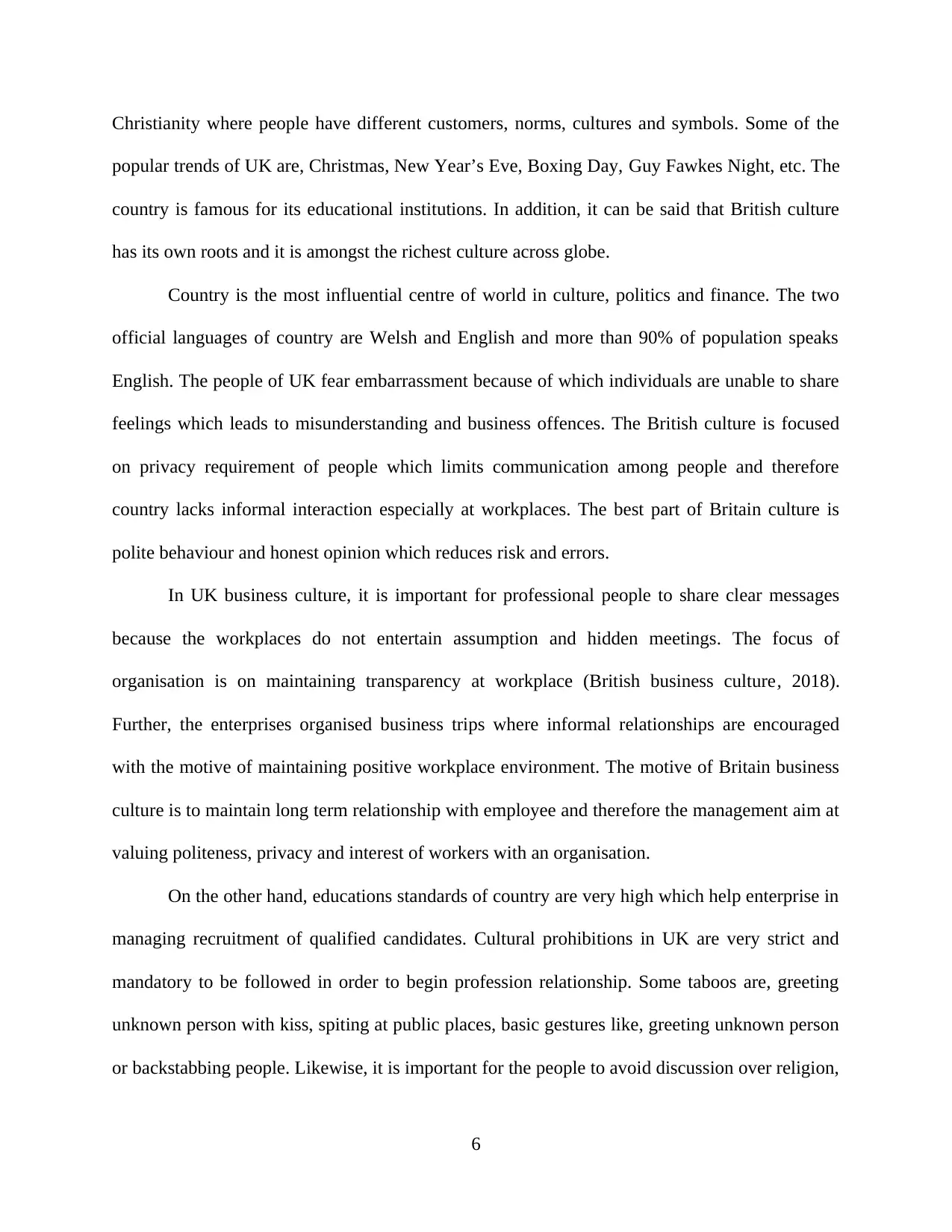
Christianity where people have different customers, norms, cultures and symbols. Some of the
popular trends of UK are, Christmas, New Year’s Eve, Boxing Day, Guy Fawkes Night, etc. The
country is famous for its educational institutions. In addition, it can be said that British culture
has its own roots and it is amongst the richest culture across globe.
Country is the most influential centre of world in culture, politics and finance. The two
official languages of country are Welsh and English and more than 90% of population speaks
English. The people of UK fear embarrassment because of which individuals are unable to share
feelings which leads to misunderstanding and business offences. The British culture is focused
on privacy requirement of people which limits communication among people and therefore
country lacks informal interaction especially at workplaces. The best part of Britain culture is
polite behaviour and honest opinion which reduces risk and errors.
In UK business culture, it is important for professional people to share clear messages
because the workplaces do not entertain assumption and hidden meetings. The focus of
organisation is on maintaining transparency at workplace (British business culture, 2018).
Further, the enterprises organised business trips where informal relationships are encouraged
with the motive of maintaining positive workplace environment. The motive of Britain business
culture is to maintain long term relationship with employee and therefore the management aim at
valuing politeness, privacy and interest of workers with an organisation.
On the other hand, educations standards of country are very high which help enterprise in
managing recruitment of qualified candidates. Cultural prohibitions in UK are very strict and
mandatory to be followed in order to begin profession relationship. Some taboos are, greeting
unknown person with kiss, spiting at public places, basic gestures like, greeting unknown person
or backstabbing people. Likewise, it is important for the people to avoid discussion over religion,
6
popular trends of UK are, Christmas, New Year’s Eve, Boxing Day, Guy Fawkes Night, etc. The
country is famous for its educational institutions. In addition, it can be said that British culture
has its own roots and it is amongst the richest culture across globe.
Country is the most influential centre of world in culture, politics and finance. The two
official languages of country are Welsh and English and more than 90% of population speaks
English. The people of UK fear embarrassment because of which individuals are unable to share
feelings which leads to misunderstanding and business offences. The British culture is focused
on privacy requirement of people which limits communication among people and therefore
country lacks informal interaction especially at workplaces. The best part of Britain culture is
polite behaviour and honest opinion which reduces risk and errors.
In UK business culture, it is important for professional people to share clear messages
because the workplaces do not entertain assumption and hidden meetings. The focus of
organisation is on maintaining transparency at workplace (British business culture, 2018).
Further, the enterprises organised business trips where informal relationships are encouraged
with the motive of maintaining positive workplace environment. The motive of Britain business
culture is to maintain long term relationship with employee and therefore the management aim at
valuing politeness, privacy and interest of workers with an organisation.
On the other hand, educations standards of country are very high which help enterprise in
managing recruitment of qualified candidates. Cultural prohibitions in UK are very strict and
mandatory to be followed in order to begin profession relationship. Some taboos are, greeting
unknown person with kiss, spiting at public places, basic gestures like, greeting unknown person
or backstabbing people. Likewise, it is important for the people to avoid discussion over religion,
6
⊘ This is a preview!⊘
Do you want full access?
Subscribe today to unlock all pages.

Trusted by 1+ million students worldwide
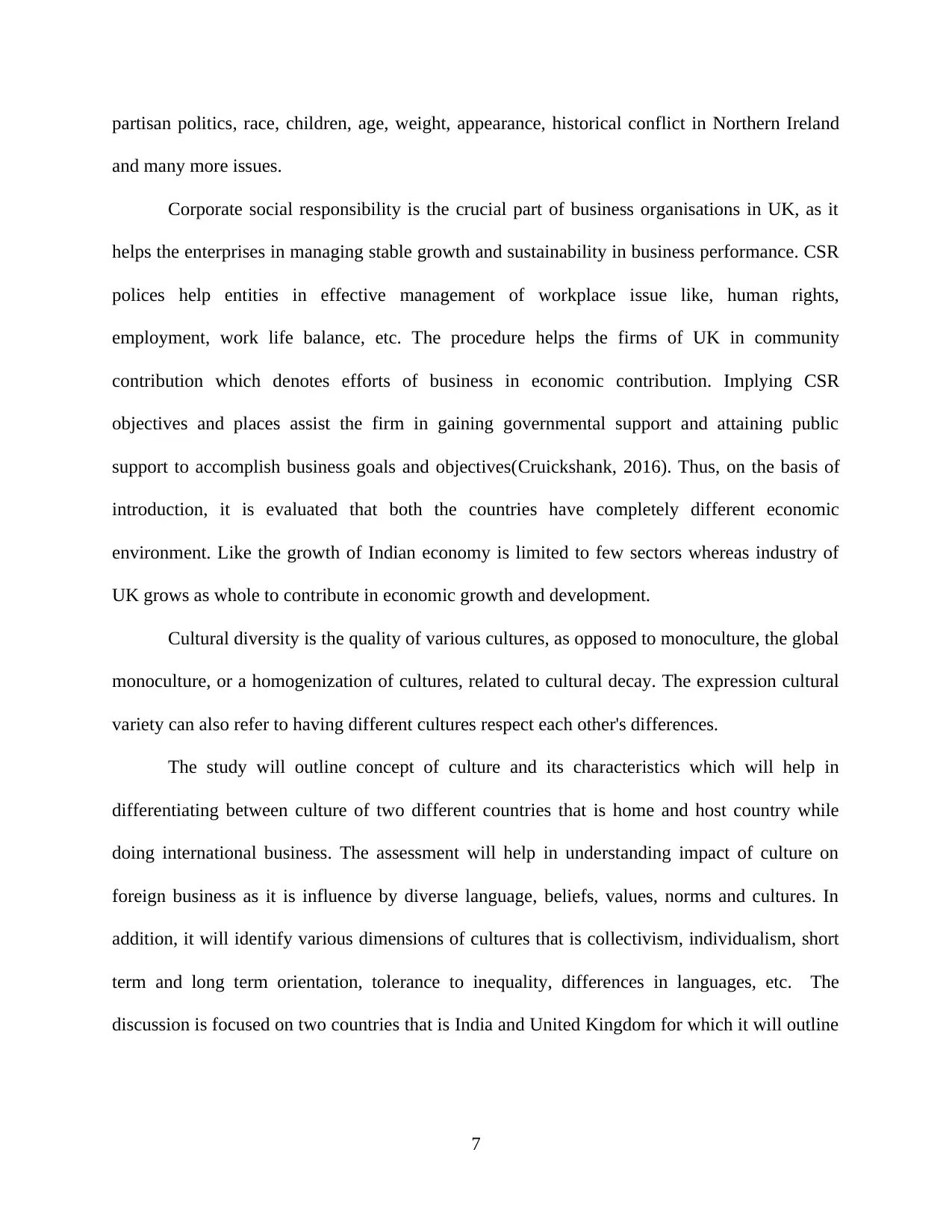
partisan politics, race, children, age, weight, appearance, historical conflict in Northern Ireland
and many more issues.
Corporate social responsibility is the crucial part of business organisations in UK, as it
helps the enterprises in managing stable growth and sustainability in business performance. CSR
polices help entities in effective management of workplace issue like, human rights,
employment, work life balance, etc. The procedure helps the firms of UK in community
contribution which denotes efforts of business in economic contribution. Implying CSR
objectives and places assist the firm in gaining governmental support and attaining public
support to accomplish business goals and objectives(Cruickshank, 2016). Thus, on the basis of
introduction, it is evaluated that both the countries have completely different economic
environment. Like the growth of Indian economy is limited to few sectors whereas industry of
UK grows as whole to contribute in economic growth and development.
Cultural diversity is the quality of various cultures, as opposed to monoculture, the global
monoculture, or a homogenization of cultures, related to cultural decay. The expression cultural
variety can also refer to having different cultures respect each other's differences.
The study will outline concept of culture and its characteristics which will help in
differentiating between culture of two different countries that is home and host country while
doing international business. The assessment will help in understanding impact of culture on
foreign business as it is influence by diverse language, beliefs, values, norms and cultures. In
addition, it will identify various dimensions of cultures that is collectivism, individualism, short
term and long term orientation, tolerance to inequality, differences in languages, etc. The
discussion is focused on two countries that is India and United Kingdom for which it will outline
7
and many more issues.
Corporate social responsibility is the crucial part of business organisations in UK, as it
helps the enterprises in managing stable growth and sustainability in business performance. CSR
polices help entities in effective management of workplace issue like, human rights,
employment, work life balance, etc. The procedure helps the firms of UK in community
contribution which denotes efforts of business in economic contribution. Implying CSR
objectives and places assist the firm in gaining governmental support and attaining public
support to accomplish business goals and objectives(Cruickshank, 2016). Thus, on the basis of
introduction, it is evaluated that both the countries have completely different economic
environment. Like the growth of Indian economy is limited to few sectors whereas industry of
UK grows as whole to contribute in economic growth and development.
Cultural diversity is the quality of various cultures, as opposed to monoculture, the global
monoculture, or a homogenization of cultures, related to cultural decay. The expression cultural
variety can also refer to having different cultures respect each other's differences.
The study will outline concept of culture and its characteristics which will help in
differentiating between culture of two different countries that is home and host country while
doing international business. The assessment will help in understanding impact of culture on
foreign business as it is influence by diverse language, beliefs, values, norms and cultures. In
addition, it will identify various dimensions of cultures that is collectivism, individualism, short
term and long term orientation, tolerance to inequality, differences in languages, etc. The
discussion is focused on two countries that is India and United Kingdom for which it will outline
7
Paraphrase This Document
Need a fresh take? Get an instant paraphrase of this document with our AI Paraphraser
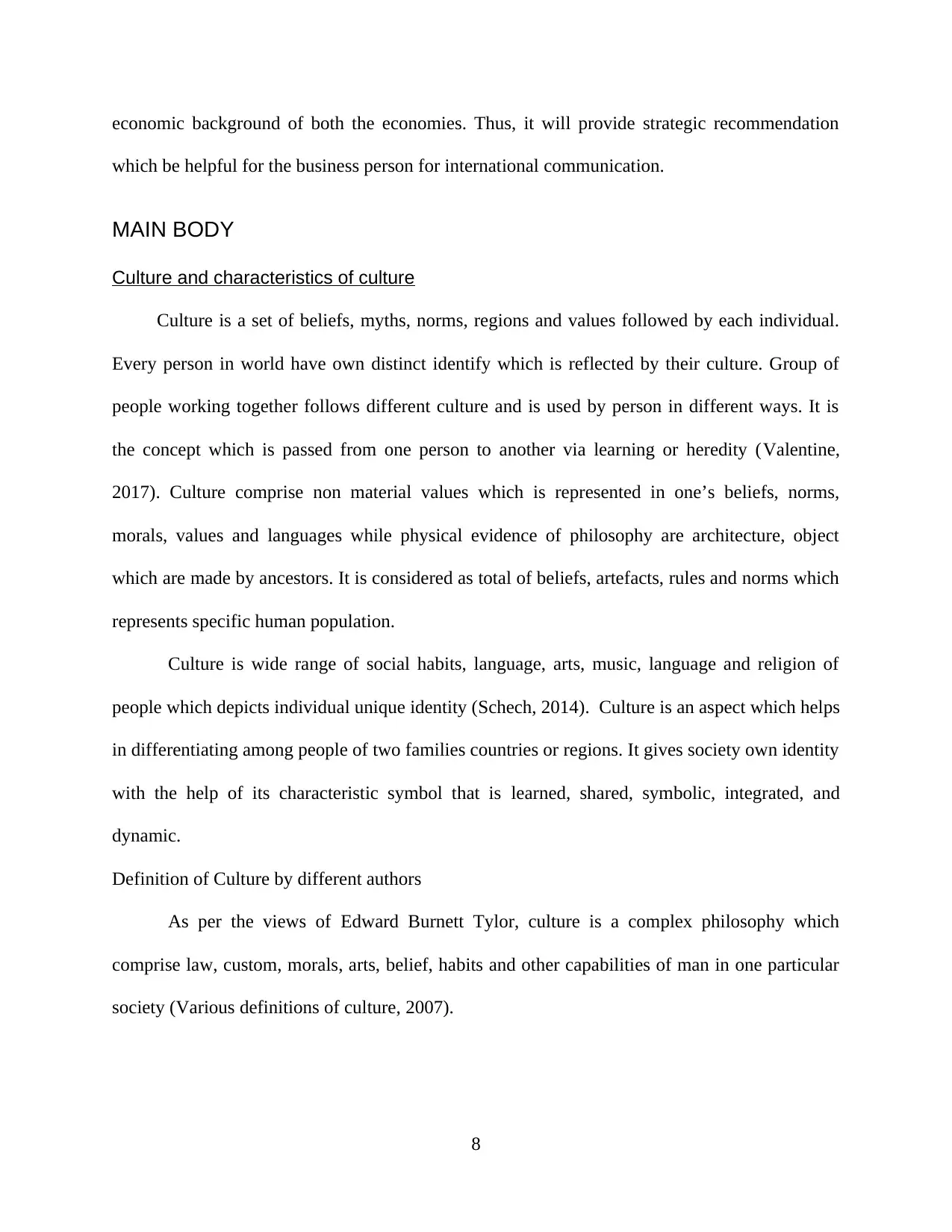
economic background of both the economies. Thus, it will provide strategic recommendation
which be helpful for the business person for international communication.
MAIN BODY
Culture and characteristics of culture
Culture is a set of beliefs, myths, norms, regions and values followed by each individual.
Every person in world have own distinct identify which is reflected by their culture. Group of
people working together follows different culture and is used by person in different ways. It is
the concept which is passed from one person to another via learning or heredity (Valentine,
2017). Culture comprise non material values which is represented in one’s beliefs, norms,
morals, values and languages while physical evidence of philosophy are architecture, object
which are made by ancestors. It is considered as total of beliefs, artefacts, rules and norms which
represents specific human population.
Culture is wide range of social habits, language, arts, music, language and religion of
people which depicts individual unique identity (Schech, 2014). Culture is an aspect which helps
in differentiating among people of two families countries or regions. It gives society own identity
with the help of its characteristic symbol that is learned, shared, symbolic, integrated, and
dynamic.
Definition of Culture by different authors
As per the views of Edward Burnett Tylor, culture is a complex philosophy which
comprise law, custom, morals, arts, belief, habits and other capabilities of man in one particular
society (Various definitions of culture, 2007).
8
which be helpful for the business person for international communication.
MAIN BODY
Culture and characteristics of culture
Culture is a set of beliefs, myths, norms, regions and values followed by each individual.
Every person in world have own distinct identify which is reflected by their culture. Group of
people working together follows different culture and is used by person in different ways. It is
the concept which is passed from one person to another via learning or heredity (Valentine,
2017). Culture comprise non material values which is represented in one’s beliefs, norms,
morals, values and languages while physical evidence of philosophy are architecture, object
which are made by ancestors. It is considered as total of beliefs, artefacts, rules and norms which
represents specific human population.
Culture is wide range of social habits, language, arts, music, language and religion of
people which depicts individual unique identity (Schech, 2014). Culture is an aspect which helps
in differentiating among people of two families countries or regions. It gives society own identity
with the help of its characteristic symbol that is learned, shared, symbolic, integrated, and
dynamic.
Definition of Culture by different authors
As per the views of Edward Burnett Tylor, culture is a complex philosophy which
comprise law, custom, morals, arts, belief, habits and other capabilities of man in one particular
society (Various definitions of culture, 2007).
8
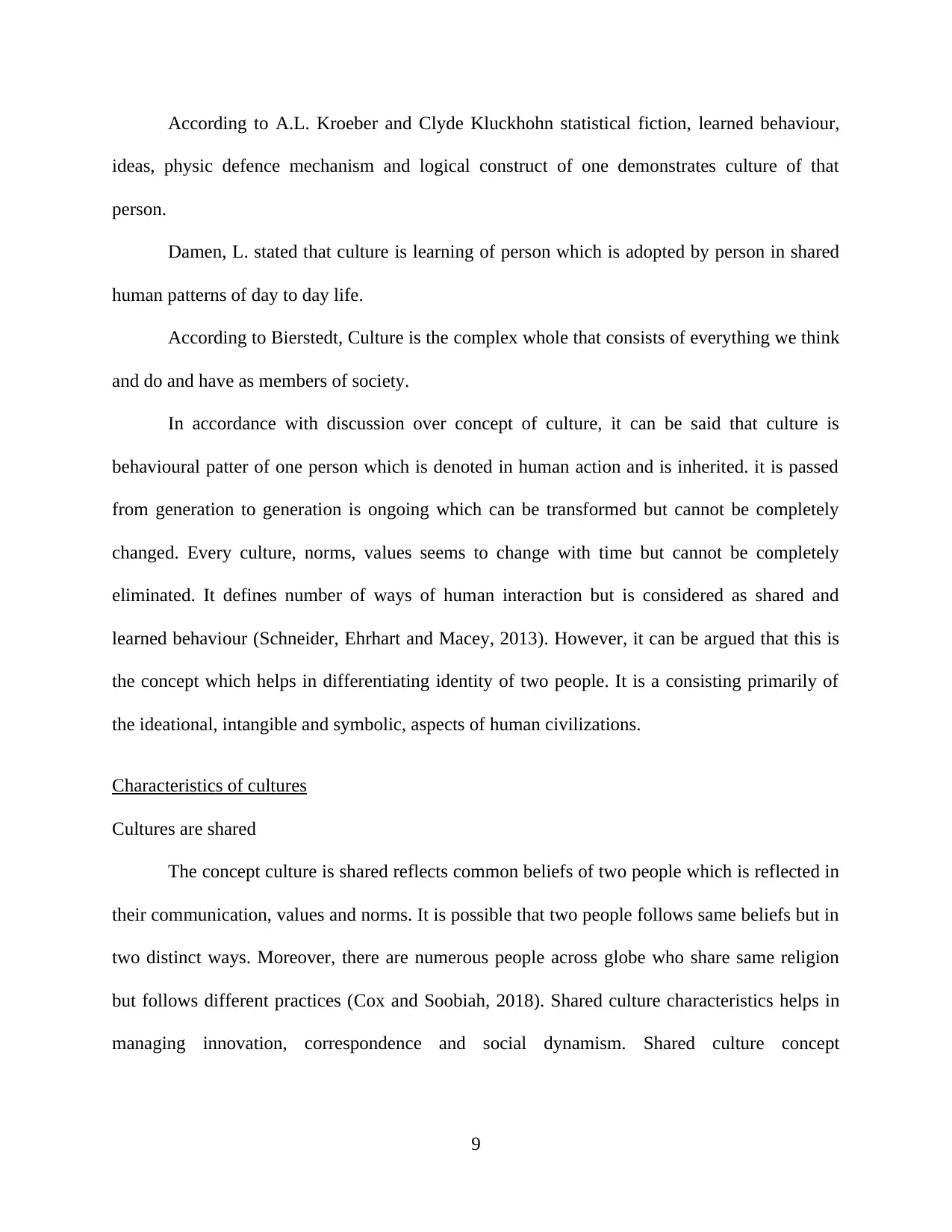
According to A.L. Kroeber and Clyde Kluckhohn statistical fiction, learned behaviour,
ideas, physic defence mechanism and logical construct of one demonstrates culture of that
person.
Damen, L. stated that culture is learning of person which is adopted by person in shared
human patterns of day to day life.
According to Bierstedt, Culture is the complex whole that consists of everything we think
and do and have as members of society.
In accordance with discussion over concept of culture, it can be said that culture is
behavioural patter of one person which is denoted in human action and is inherited. it is passed
from generation to generation is ongoing which can be transformed but cannot be completely
changed. Every culture, norms, values seems to change with time but cannot be completely
eliminated. It defines number of ways of human interaction but is considered as shared and
learned behaviour (Schneider, Ehrhart and Macey, 2013). However, it can be argued that this is
the concept which helps in differentiating identity of two people. It is a consisting primarily of
the ideational, intangible and symbolic, aspects of human civilizations.
Characteristics of cultures
Cultures are shared
The concept culture is shared reflects common beliefs of two people which is reflected in
their communication, values and norms. It is possible that two people follows same beliefs but in
two distinct ways. Moreover, there are numerous people across globe who share same religion
but follows different practices (Cox and Soobiah, 2018). Shared culture characteristics helps in
managing innovation, correspondence and social dynamism. Shared culture concept
9
ideas, physic defence mechanism and logical construct of one demonstrates culture of that
person.
Damen, L. stated that culture is learning of person which is adopted by person in shared
human patterns of day to day life.
According to Bierstedt, Culture is the complex whole that consists of everything we think
and do and have as members of society.
In accordance with discussion over concept of culture, it can be said that culture is
behavioural patter of one person which is denoted in human action and is inherited. it is passed
from generation to generation is ongoing which can be transformed but cannot be completely
changed. Every culture, norms, values seems to change with time but cannot be completely
eliminated. It defines number of ways of human interaction but is considered as shared and
learned behaviour (Schneider, Ehrhart and Macey, 2013). However, it can be argued that this is
the concept which helps in differentiating identity of two people. It is a consisting primarily of
the ideational, intangible and symbolic, aspects of human civilizations.
Characteristics of cultures
Cultures are shared
The concept culture is shared reflects common beliefs of two people which is reflected in
their communication, values and norms. It is possible that two people follows same beliefs but in
two distinct ways. Moreover, there are numerous people across globe who share same religion
but follows different practices (Cox and Soobiah, 2018). Shared culture characteristics helps in
managing innovation, correspondence and social dynamism. Shared culture concept
9
⊘ This is a preview!⊘
Do you want full access?
Subscribe today to unlock all pages.

Trusted by 1+ million students worldwide
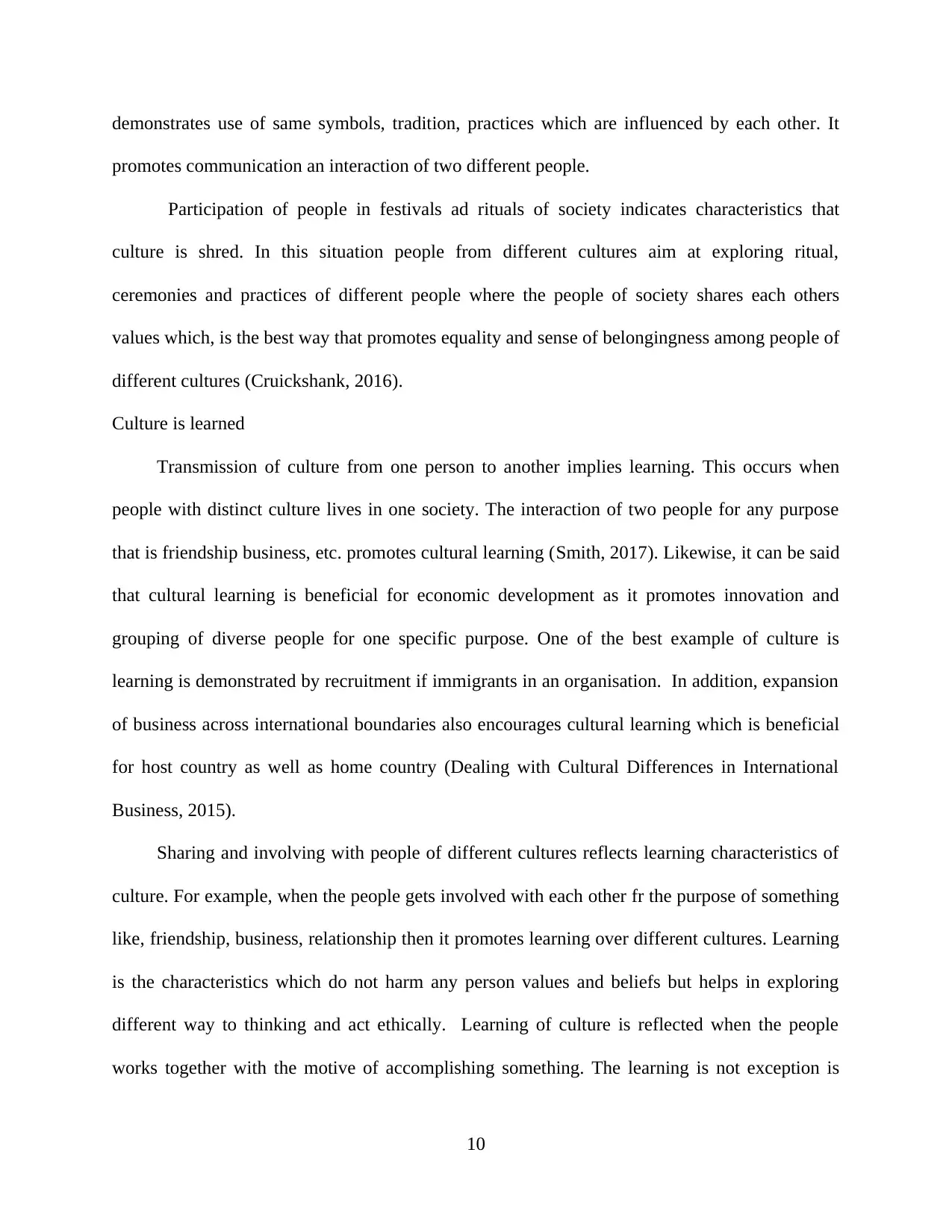
demonstrates use of same symbols, tradition, practices which are influenced by each other. It
promotes communication an interaction of two different people.
Participation of people in festivals ad rituals of society indicates characteristics that
culture is shred. In this situation people from different cultures aim at exploring ritual,
ceremonies and practices of different people where the people of society shares each others
values which, is the best way that promotes equality and sense of belongingness among people of
different cultures (Cruickshank, 2016).
Culture is learned
Transmission of culture from one person to another implies learning. This occurs when
people with distinct culture lives in one society. The interaction of two people for any purpose
that is friendship business, etc. promotes cultural learning (Smith, 2017). Likewise, it can be said
that cultural learning is beneficial for economic development as it promotes innovation and
grouping of diverse people for one specific purpose. One of the best example of culture is
learning is demonstrated by recruitment if immigrants in an organisation. In addition, expansion
of business across international boundaries also encourages cultural learning which is beneficial
for host country as well as home country (Dealing with Cultural Differences in International
Business, 2015).
Sharing and involving with people of different cultures reflects learning characteristics of
culture. For example, when the people gets involved with each other fr the purpose of something
like, friendship, business, relationship then it promotes learning over different cultures. Learning
is the characteristics which do not harm any person values and beliefs but helps in exploring
different way to thinking and act ethically. Learning of culture is reflected when the people
works together with the motive of accomplishing something. The learning is not exception is
10
promotes communication an interaction of two different people.
Participation of people in festivals ad rituals of society indicates characteristics that
culture is shred. In this situation people from different cultures aim at exploring ritual,
ceremonies and practices of different people where the people of society shares each others
values which, is the best way that promotes equality and sense of belongingness among people of
different cultures (Cruickshank, 2016).
Culture is learned
Transmission of culture from one person to another implies learning. This occurs when
people with distinct culture lives in one society. The interaction of two people for any purpose
that is friendship business, etc. promotes cultural learning (Smith, 2017). Likewise, it can be said
that cultural learning is beneficial for economic development as it promotes innovation and
grouping of diverse people for one specific purpose. One of the best example of culture is
learning is demonstrated by recruitment if immigrants in an organisation. In addition, expansion
of business across international boundaries also encourages cultural learning which is beneficial
for host country as well as home country (Dealing with Cultural Differences in International
Business, 2015).
Sharing and involving with people of different cultures reflects learning characteristics of
culture. For example, when the people gets involved with each other fr the purpose of something
like, friendship, business, relationship then it promotes learning over different cultures. Learning
is the characteristics which do not harm any person values and beliefs but helps in exploring
different way to thinking and act ethically. Learning of culture is reflected when the people
works together with the motive of accomplishing something. The learning is not exception is
10
Paraphrase This Document
Need a fresh take? Get an instant paraphrase of this document with our AI Paraphraser
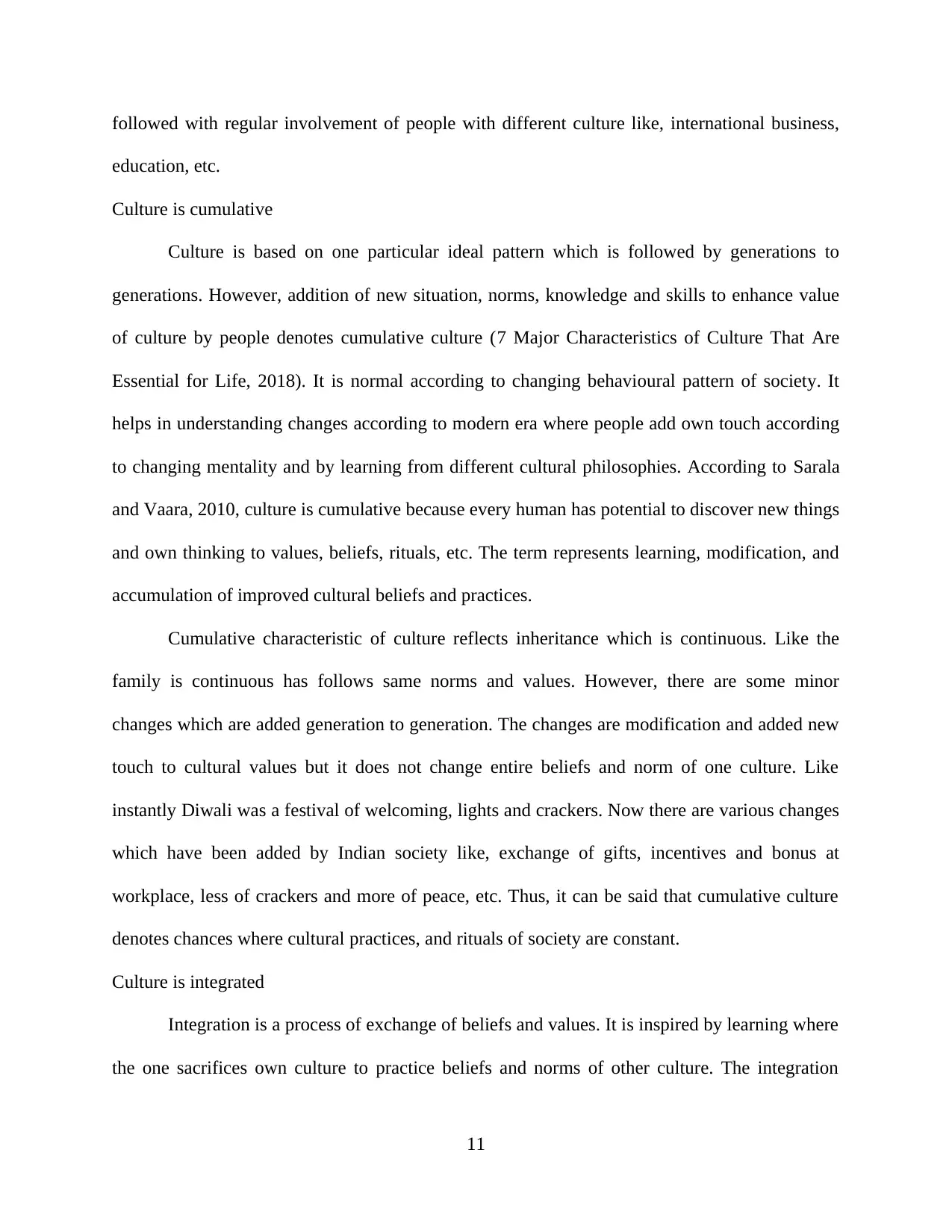
followed with regular involvement of people with different culture like, international business,
education, etc.
Culture is cumulative
Culture is based on one particular ideal pattern which is followed by generations to
generations. However, addition of new situation, norms, knowledge and skills to enhance value
of culture by people denotes cumulative culture (7 Major Characteristics of Culture That Are
Essential for Life, 2018). It is normal according to changing behavioural pattern of society. It
helps in understanding changes according to modern era where people add own touch according
to changing mentality and by learning from different cultural philosophies. According to Sarala
and Vaara, 2010, culture is cumulative because every human has potential to discover new things
and own thinking to values, beliefs, rituals, etc. The term represents learning, modification, and
accumulation of improved cultural beliefs and practices.
Cumulative characteristic of culture reflects inheritance which is continuous. Like the
family is continuous has follows same norms and values. However, there are some minor
changes which are added generation to generation. The changes are modification and added new
touch to cultural values but it does not change entire beliefs and norm of one culture. Like
instantly Diwali was a festival of welcoming, lights and crackers. Now there are various changes
which have been added by Indian society like, exchange of gifts, incentives and bonus at
workplace, less of crackers and more of peace, etc. Thus, it can be said that cumulative culture
denotes chances where cultural practices, and rituals of society are constant.
Culture is integrated
Integration is a process of exchange of beliefs and values. It is inspired by learning where
the one sacrifices own culture to practice beliefs and norms of other culture. The integration
11
education, etc.
Culture is cumulative
Culture is based on one particular ideal pattern which is followed by generations to
generations. However, addition of new situation, norms, knowledge and skills to enhance value
of culture by people denotes cumulative culture (7 Major Characteristics of Culture That Are
Essential for Life, 2018). It is normal according to changing behavioural pattern of society. It
helps in understanding changes according to modern era where people add own touch according
to changing mentality and by learning from different cultural philosophies. According to Sarala
and Vaara, 2010, culture is cumulative because every human has potential to discover new things
and own thinking to values, beliefs, rituals, etc. The term represents learning, modification, and
accumulation of improved cultural beliefs and practices.
Cumulative characteristic of culture reflects inheritance which is continuous. Like the
family is continuous has follows same norms and values. However, there are some minor
changes which are added generation to generation. The changes are modification and added new
touch to cultural values but it does not change entire beliefs and norm of one culture. Like
instantly Diwali was a festival of welcoming, lights and crackers. Now there are various changes
which have been added by Indian society like, exchange of gifts, incentives and bonus at
workplace, less of crackers and more of peace, etc. Thus, it can be said that cumulative culture
denotes chances where cultural practices, and rituals of society are constant.
Culture is integrated
Integration is a process of exchange of beliefs and values. It is inspired by learning where
the one sacrifices own culture to practice beliefs and norms of other culture. The integration
11
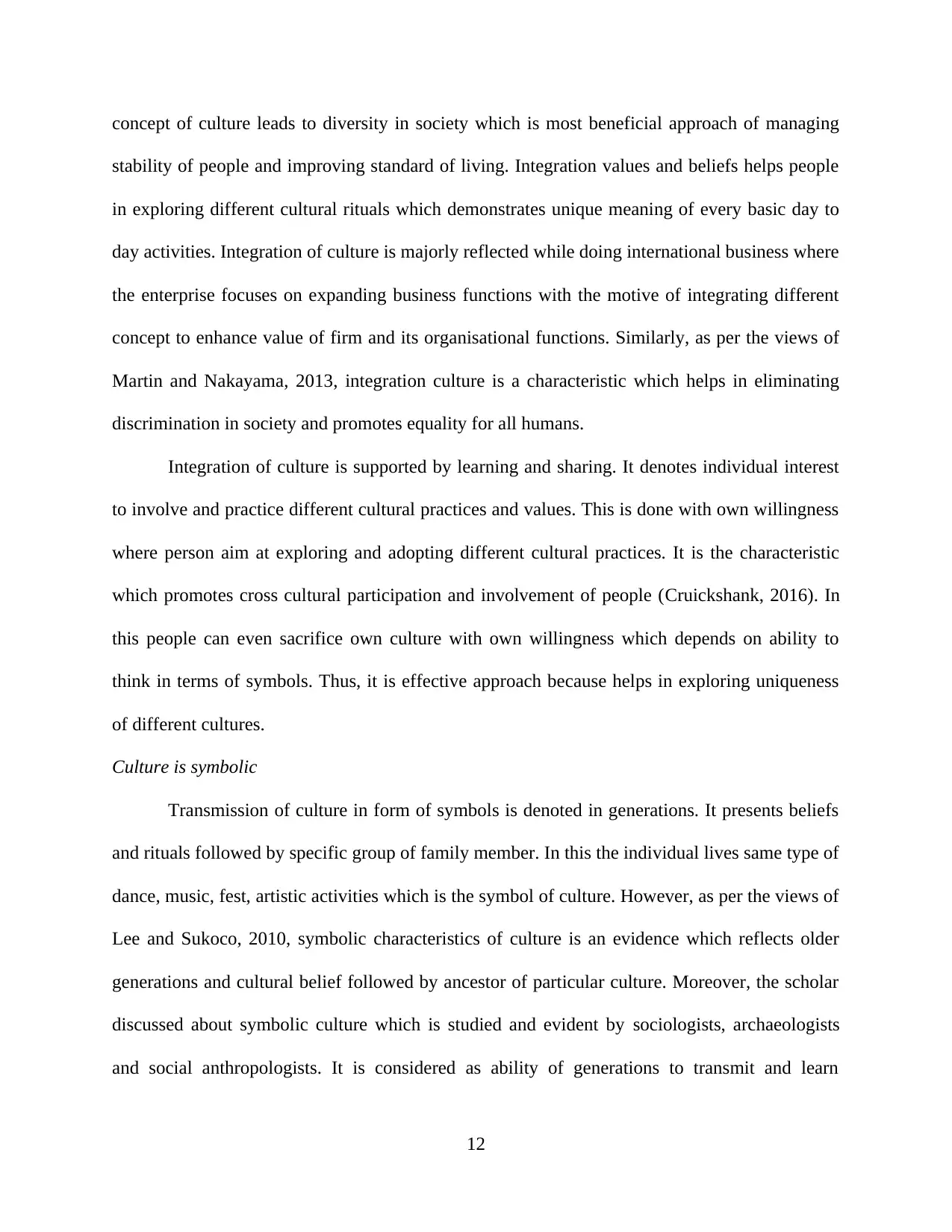
concept of culture leads to diversity in society which is most beneficial approach of managing
stability of people and improving standard of living. Integration values and beliefs helps people
in exploring different cultural rituals which demonstrates unique meaning of every basic day to
day activities. Integration of culture is majorly reflected while doing international business where
the enterprise focuses on expanding business functions with the motive of integrating different
concept to enhance value of firm and its organisational functions. Similarly, as per the views of
Martin and Nakayama, 2013, integration culture is a characteristic which helps in eliminating
discrimination in society and promotes equality for all humans.
Integration of culture is supported by learning and sharing. It denotes individual interest
to involve and practice different cultural practices and values. This is done with own willingness
where person aim at exploring and adopting different cultural practices. It is the characteristic
which promotes cross cultural participation and involvement of people (Cruickshank, 2016). In
this people can even sacrifice own culture with own willingness which depends on ability to
think in terms of symbols. Thus, it is effective approach because helps in exploring uniqueness
of different cultures.
Culture is symbolic
Transmission of culture in form of symbols is denoted in generations. It presents beliefs
and rituals followed by specific group of family member. In this the individual lives same type of
dance, music, fest, artistic activities which is the symbol of culture. However, as per the views of
Lee and Sukoco, 2010, symbolic characteristics of culture is an evidence which reflects older
generations and cultural belief followed by ancestor of particular culture. Moreover, the scholar
discussed about symbolic culture which is studied and evident by sociologists, archaeologists
and social anthropologists. It is considered as ability of generations to transmit and learn
12
stability of people and improving standard of living. Integration values and beliefs helps people
in exploring different cultural rituals which demonstrates unique meaning of every basic day to
day activities. Integration of culture is majorly reflected while doing international business where
the enterprise focuses on expanding business functions with the motive of integrating different
concept to enhance value of firm and its organisational functions. Similarly, as per the views of
Martin and Nakayama, 2013, integration culture is a characteristic which helps in eliminating
discrimination in society and promotes equality for all humans.
Integration of culture is supported by learning and sharing. It denotes individual interest
to involve and practice different cultural practices and values. This is done with own willingness
where person aim at exploring and adopting different cultural practices. It is the characteristic
which promotes cross cultural participation and involvement of people (Cruickshank, 2016). In
this people can even sacrifice own culture with own willingness which depends on ability to
think in terms of symbols. Thus, it is effective approach because helps in exploring uniqueness
of different cultures.
Culture is symbolic
Transmission of culture in form of symbols is denoted in generations. It presents beliefs
and rituals followed by specific group of family member. In this the individual lives same type of
dance, music, fest, artistic activities which is the symbol of culture. However, as per the views of
Lee and Sukoco, 2010, symbolic characteristics of culture is an evidence which reflects older
generations and cultural belief followed by ancestor of particular culture. Moreover, the scholar
discussed about symbolic culture which is studied and evident by sociologists, archaeologists
and social anthropologists. It is considered as ability of generations to transmit and learn
12
⊘ This is a preview!⊘
Do you want full access?
Subscribe today to unlock all pages.

Trusted by 1+ million students worldwide
1 out of 54
Related Documents
Your All-in-One AI-Powered Toolkit for Academic Success.
+13062052269
info@desklib.com
Available 24*7 on WhatsApp / Email
![[object Object]](/_next/static/media/star-bottom.7253800d.svg)
Unlock your academic potential
Copyright © 2020–2026 A2Z Services. All Rights Reserved. Developed and managed by ZUCOL.





